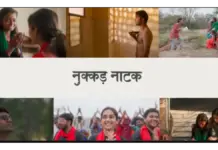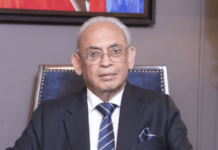K9 Films’ Firangi (UA) is set in pre-Independence India. It is the story of a young man, considered good for nothing, rising to the occasion and coming to the rescue of an entire village.
Manga (Kapil Sharma) lives in Behrampur with his family. His father (Sharan Makkar) keeps taunting him for idling away his time. His grandmother (Jatinder Kaur) dotes on him, though. Manga is God-gifted. He has the ability to cure anyone suffering from a stiff back, by merely kicking him, an ability believed to be special to people born upside down. This ability, in fact, gets him a job as the orderly of British officer Daniels (Edward Sonnenblick).
But before that, Manga goes to the neighbouring village, Nakku Guda, to attend close friend Heera’s (Inam-ul-haq) marriage. There, he falls in love with Sargi (Ishita Dutta) who reciprocates his advances. However, when Manga’s family goes to Sargi’s family with a marriage proposal, Sargi’s grandfather (Anjan Srivastav), who is a Gandhian, refuses the proposal because Manga works for the Britishers who, according to the grandfather, need to be thrown out of the country. Manga vows to win over Sargi’s grandpa. Sadly, just the reverse happens. Not only the grandfather, Manga actually ends up winning the wrath of Sargi’s entire village.
British officer Daniels colludes with king Inderveer Singh (Kumud Mishra) and decides to build a liquor factory in Nakku Guda after vacating the entire village – and the two use Manga to prompt the villagers to attend a party in which they are treated to dance and a lot of drinks. To their horror, the villagers realise the next morning that in their drunken state, they had been made to give their thumb impressions on a stamped paper which mentioned that they all were voluntarily giving up their plots of land for the proposed liquor factory. Although Manga is innocent and had merely been used by Daniels and king Inderveer Singh, he is accused by the villagers of Nakku Guda of having stabbed them in the back. How Manga comes to the rescue of the villagers and saves them from being displaced forms the crux of the rest of the drama.
Rajiev Dhingra’s story is fresh and reasonably good. It is laced with a lot of humour which is both, entertaining and engaging. However, the story, especially the part in which Manga rises to the occasion, looks too simplistic and like a fairy tale. The screenplay, written by Rajiev Dhingra, Balwinder Singh Janjua and Rupinder Chahal, is good as far as the light moments are concerned. But the emotional and patriotic angles are simply not exploited by the trio. Because of this, the entire exercise of Manga to get back the legal paper with the thumb impressions of the residents of Nakku Guda looks merely like an exercise to undo the wrong, however inadvertent it may have been on his part. The emotional angle of doing what he is doing, also because he loves Sargi doesn’t come through very well. In a way, the writers haven’t been able to strike a balance between the love story and the village drama. Consequently, the story of Manga’s romance comes in spurts, as if to remind the audiences, at regular intervals, that it is at the core of the unfolding drama. The three screenplay writers are also unable to evoke patriotic feelings in the viewers while Manga rescues the villagers from the clutches of the manipulative Daniels and the evil king. The inability to exploit the emotional and patriotic sides of the drama is the biggest drawback of the screenplay which, therefore, at times, starts looking like a fairy tale and too simplistic to be true. The writers probably lost control of the multitude of tracks along the way. For instance, they could’ve easily milked the emotions by showing Manga’s constantly-taunting father feeling elated after Manga’s heroic deed. Likewise, the emotions of the family members of Manga and others and of the residents of Nakku Guda have not been exploited at all. The sum total of the screenplay’s shortcomings is that while the comedy scenes evoke laughter which, at times, is too much, the dramatic portions fall short of expectations. The first half of the pre-interval portion is, therefore, cute and entertaining because of the light moments, but the drama becomes quite boring thereafter. In the post-interval portion, the last part – from the time Manga enlists the support of four villagers viz. Heera, Sargi’s father, the local hakeem (Jameel Khan) and the local toughie (Vishal Om Prakash) – is hilarious and truly entertaining. But the climax (with Mahatma Gandhi’s arrival) looks a bit of a mismatch if only because the patriotic feelings don’t really get aroused. At times, in the second half, the viewers are served very good comic moments but those very moments dilute the emotions. Clearly, this is a failing of the screenplay writers.
Dialogues, written by Rajesh Chawla and Rajiev Dhingra, are superb but mainly the comic ones.
Kapil Sharma acts with effortless ease and impresses with a fine performance. He has such an innocent and endearing face that one can’t help but like him as Manga. Ishita Dutta gets limited scope in the role of Sargi but she acts ably. Monica Gill is fairly nice as Shyamli. Kumud Mishra is pretty effective. Anjan Srivastav makes his presence felt as Sargi’s Gandhian grandfather. Edward Sonnenblick has his moments as Daniels. Rajesh Sharma lends very good support in the role of Sargi’s father. Inam-ul-haq brings the house down with laughter as Manga’s friend, Heera, especially in scenes of cross-dressing. Jameel Khan’s (as hakeem) comic sense of timing is excellent. Vishal Om Prakash leaves a mark as the toughie. Jatinder Kaur is good as Manga’s grandmother. Neeta Mohindra acts quite well as Shyamli’s mother and one of the many wives of the king. Baby Nayesha Khanna is very cute and natural as Lali. Roshni Walia creates a fine impression as Nimmo. Sharan Makkar makes a mark as Manga’s father. Jasveen Kaur (as Heera’s wife), Swarn Singh (as the mukhiya of Nakku Guda), Sukhi Chahal (as the thekedaar), Rakesh Pandey (as mukhiya of Behrampur), Kamlesh (as Mahatma Gandhi), Mar yam Zakaria and the others provide able support.
Rajiev Dhingra’s direction is good but he has not been able to exploit the emotional side of the drama. Although Jatinder Shah’s music is nice, none of the songs are very popular. His background music is quite appealing. Lyrics (by Dr. Devendra Kafir, Ashraf Ali and Krishna Bhardwaj) are very effective. Rekha Chinni Prakash’s choreography is okay. Navneet Misser’s cinematography is eye-filling. Raashid Rangrez’s production designing, and Shabana Khanam’s art direction are nice. Amin Khatib’s action scenes are alright. Omkar Nath Bhakri’s editing is suitably sharp.
On the whole, Firangi has very good comedy, especially in the second half, but the drama portion lacks plausibility, emotions and the patriotic feel. It will, therefore, find the going at the box-office pretty tough.




























